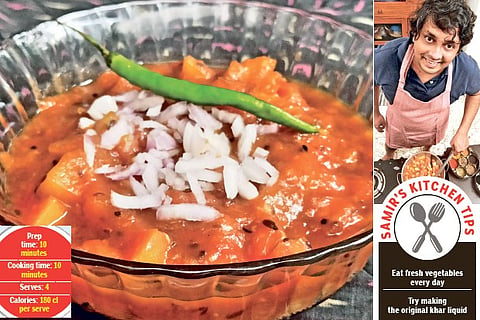

Chennai
A big foodie, he attributes it to his grandmother and mother who keep carefully handwritten notes of the age-old recipes, handed over to them. His wife Jasmine is a strict vegetarian and introduced him to cooking without onions and garlic like the mouth-melting sesame teplas and khandvi. His Bengali background made him lean towards everything creative, innovative and tasty in food.
Just before the lockdown, he had travelled to New Delhi and visited actor Adil Hussain who is a passionate cook and innovates and discovers heritage dishes. Adil recently donned the chef’s cap for a day — he took over the Nimtho kitchen in Delhi to prepare dishes from northeast states. In Adil’s house, Samir tasted a dish called omrita khar for the first time and was intrigued by the way it was made and its properties. Adil packed a bottle of khar for Samir to bring back to Puducherry and that got Samir cooking and trying it out in his kitchen. Assamese style of cooking favours fermentation and drying as forms of preservation. The cooking is influenced by the vegetables and fruits grown and the wildlife and seafood available. The cuisine is marked by using very little spices but lots of fresh natural material. A typical Assamese meal begins with khar and ends with tenga, a sour dish. Food is mostly served in bell metal utensils made by the Maria tribes.
Samir explained that the extract of khar (alkali) is an umami flavouring juice that is made by filtering water through the ashes of sun-dried skin of a few varieties of banana. Khar is synonymous with Assamese cuisine. It is cooked with a seasonal vegetable like papaya (omita), water gourd (pani lau) or mustard greens (lai haak). However, due to the rare availability of banana skin, we may use baking soda as a substitute. Relished as a starter, one of the most popular and easy-to-cook khar dishes is prepared with raw papaya. The dish has health benefits and is considered beneficial for digestion. Samir felt that food cooked with love was the best he could offer his parents, wife, his two children and 94-yearold grandma at this time. He attributes his simple tastes and humility to the upbringing at Puducherry and love for the exotic Asian dishes with his birthplace Singapore.
INGREDIENTS
Methi seeds: 1 tsp
Mustard oil: ¼ cup
Salt: as required
Coriander leaves: 1 tsp
Baking soda: ½ tsp
Raw green papaya: 1
large Red chilli powder: 1 tsp
Black pepper: 1 tsp
Crushed garlic: 1 tbsp
Onion: 1 cut
Green chillies: 3
Ginger: 1 tsp grated
METHOD
— Chef Ramaa Shanker is the author of ‘Festive Offerings to the Gods: Divine Soul Recipes’
Visit news.dtnext.in to explore our interactive epaper!
Download the DT Next app for more exciting features!
Click here for iOS
Click here for Android